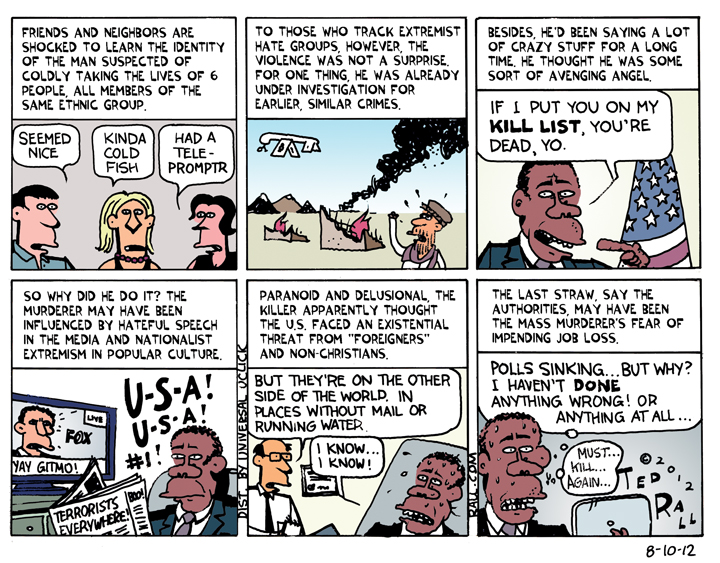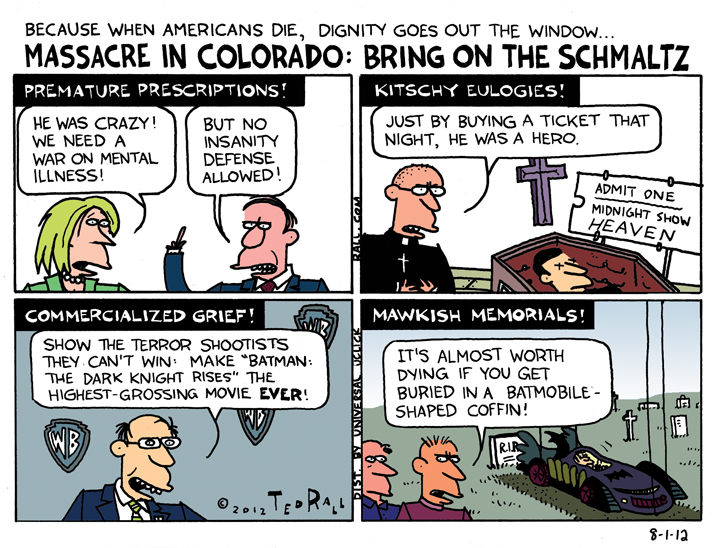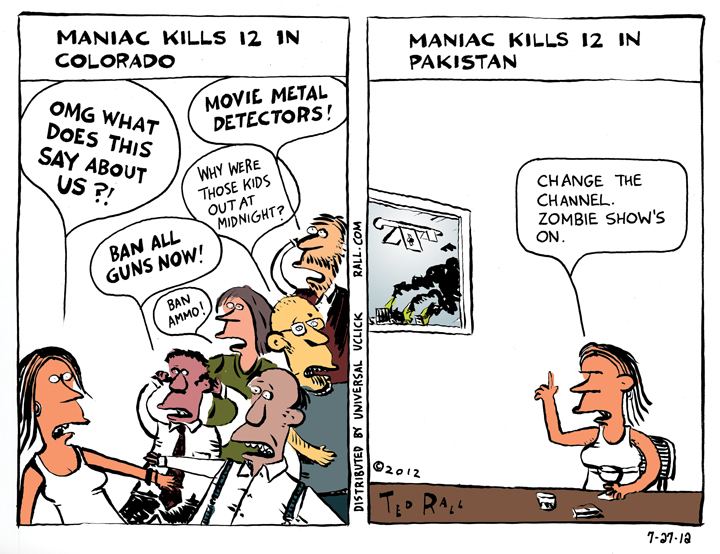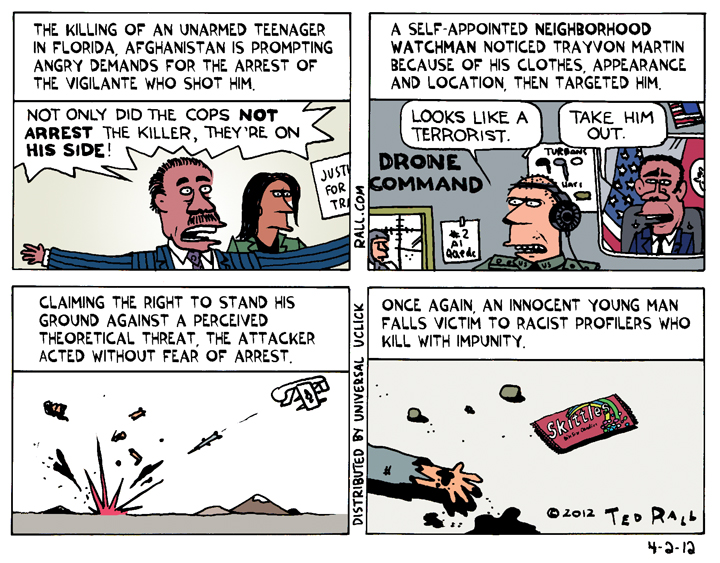Now that a crazed gunman has slaughtered 20 white kids in an upscale Connecticut suburb where a lot of media live, the gun lobby is ready to negotiate gun control legislation. But they’re not offering much.
SYNDICATED COLUMN: Shoot First, Justify Later
Our Police State Does What It Wants, Then Writes a Memo
Imagine that you were the president of United States. Now think what you would do if you or one of your advisers proposed an idea—a great idea, one that solved a big problem—that was radical to the point of possibly crossing the legal line into unconstitutionality.
You’d want to lawyer that sucker, right? After all, the last thing you would want to do is break the law. You wouldn’t want to be accused of running off half-cocked in violation of your inaugural oath to preserve and protect the Constitution. You wouldn’t want to risk a scandal, an investigation, or even impeachment.
Now imagine that you were a chief of police. Again, imagine that you or one of your officers came up with a great new approach for tracking down bad guys, but that the idea was so novel that you couldn’t be sure that arrests made using your new tactic would hold up in court. What would you do? I know what I’d do: I’d consult legal counsel. You probably would too. You’d want to know where you stood so that you and your policemen wouldn’t get into trouble, and your prosecutions would hold up in court.
Check first, act second. Logical. But that’s not how presidents or cops do things in today’s might-makes-right, do-what-you-feel-like-and-come-up-with-a-justification-for-it-later era.
Case in point: Since 2009 President Obama has ordered the CIA and the military to launch more than 300 drone strikes against people in Pakistan, Afghanistan, Yemen, Somalia and other countries, killing more than 2500 people–98% of whom were innocent, and the other 2% of which posed no threat whatsoever to Americans. (Obama killed those 2% as a favor to the U.S.-backed dictatorships they were fighting. According to The Times: “For at least two years in Pakistan, partly because of the CIA’s success in decimating Al Qaeda’s top ranks, most strikes have been directed at militants whose main battle is with the Pakistani authorities or who fight with the Taliban against American troops in Afghanistan.”)
All of these bombings and murders were committed minus the thinnest veneer of legal justification. However, now it has come out that during the final months of the 2012 presidential campaign, when polls showed that Mitt Romney had a chance of winning, Obama and his advisers gathered to begin work on a legal framework for the drone program, a set of rules that would determine how targets are picked.
“There was concern that the levers might no longer be in our hands,” an Obama official told The New York Times, speaking on condition of anonymity (always a good idea when gossiping about a boss with an itchy drone joystick).
“The effort, which would have been rushed to completion by January had Mr. Romney won, will now be finished at a more leisurely pace,” the leaker said.
Obama referenced his retroactive drone legalization project on October 18. “One of the things we’ve got to do is put a legal architecture in place, and we need Congressional help in order to do that, to make sure that not only am I reined in but any president’s reined in terms of some of the decisions that we’re making,” he told Jon Stewart.
Two-thousand five hundred dead men, women and children in, and that’s when they start hanging the legal window dressing? Isn’t this the sort of thing Obama should have thought about back in January of 2009? For that matter, shouldn’t George W. Bush, who originated the drone assassinations after 9/11, been required to put forward some sort of constitutional and legal basis before firing missiles at Afghan wedding parties?
You’d think Congress would take an interest in investigating such a radical expansion of presidential power. But no, in what passes for a democracy that’s supposedly protected from extreme behavior by a system of checks and balances and a separation of powers, the legislative branch took no interest whatsoever in a president—make that two presidents—who secretly claimed the right to murder anyone they please, even a U.S. citizen on American soil, without any accountability whatsoever?
This post-9/11 culture of top-down lawlessness has filtered down to local police departments, many of which have begun routinely searching the cellphones of suspects they arrest. During the Occupy Wall Street protests of fall 2011, many activists reported having their smartphones hooked up to police department computers and drained right in front of them, presumably to mine them for contact information and other data.
Phone companies told Congress that they turned over 1.3 million records in 2011 alone to police departments seeking location data, e-mails, text messages, phone records and other data about their customers—i.e., you and me.
It’s easy to see why cops would want to collect as much information as they can from those they deem to be criminals—although, under the system of laws we used to have, suspects are legally innocent until proven guilty—but how can they possibly justify enacting such a radical new policy before first obtaining authorization from the courts?
Most people want to think their political leaders and law enforcement authorities mean well and are using their powers wisely. And that’s what they want us to believe. In January 2012, for example, President Obama described the drone killings as “a targeted, focused effort at people who are on a list of active terrorists.” But, according to The Times, the program has broadened into something far more sinister and cynical that few Americans would support. For example, “the CIA and the military have carried out ‘signature strikes’ against groups of suspected, unknown militants…for instance, [random] young men toting arms in an area controlled by extremist groups.”
Unchecked power runs wild. Cellphones are one example. When New Yorkers file an NYPD police report that their phone has been stolen, the cops routinely subpoena your records beginning from the day of the theft. Cops are supposed to use the records to find the culprit.
In reality, however, New York’s Finest aren’t exactly pounding the pavement to find your nicked iPhone. What’s they’re really after, reports The Times, is a building its Enterprise Case Management System database, “a trove of telephone logs, all obtained without a court order, that could conceivably be used for any investigative purpose.”
No wonder the Obama Administration’s Department of Justice—which is charged with protecting your rights—says cellphone users have “no reasonable expectation of privacy.”
Why are these guys getting away with murder—literally? Because we’re letting them.
(Ted Rall‘s is the author of “The Book of Obama: How We Went From Hope and Change to the Age of Revolt.” His website is tedrall.com.)
COPYRIGHT 2012 TED RALL
Profiling the Mass Murderer
Friends and neighbors are shocked to learn the identity of the man suspected of coldly taking the lives of six people, all members of the same ethnic group. To those who keep track of extremist hate groups, however, the violence was not a surprise. For one thing, he was already under investigation for earlier, similar crimes
SYNDICATED COLUMN: Why Are Americans Killing More Cops?
“Tough on Crime” Sentencing Laws Come Home to Roost
It sounds like the plot of the dystopian movie “Robocop”: policemen are getting shot like they’re going out of style.
Violent crime in general is decreasing. But more cops are being killed in the line of duty. According to the FBI, 72 police officers died under fire in 2011. That’s up 25 percent from 2010 and up 75 percent from 2008.
“The 2011 deaths were the first time that more officers were killed by suspects than car accidents, according to data compiled by the International Association of Chiefs of Police. The number was the highest in nearly two decades, excluding those who died in the Sept. 11 attacks in 2001 and the Oklahoma City bombing in 1995,” reports The New York Times.
According to a study by the John Jay College of Criminal Justice, “In many cases the officers were trying to arrest or stop a suspect who had previously been arrested for a violent crime.”
Why this spike in cop killing?
Experts blame a variety of factors for the carnage: the economic depression, low manpower due to budget cuts, policies that assign more cops to the most dangerous neighborhoods, and more aggressive patrolling of those areas, including “stop and frisk” stops of people the police deem suspicious. Maybe.
I think something else is missing in analyses of cop shootings: the motivation of the shooter.
Corporate media outlets cite the shooters’ prior records in order to imply: once a violent felon, always a violent felon. Sometimes that’s true. But not always. There’s more to it than that. Like law-abiding citizens, criminals employ rational decision-making strategies.
Harsh sentencing laws are killing police officers.
Imagine that you’re on parole in California, one of 24 states with “three strikes” sentencing laws. Let’s say you have two prior felony convictions. It doesn’t take much. One California man earned a “strike” for “violent assault”; he landed 25 years to life for stealing pizza from some kids. In Texas, a handyman who refused to refund $120.75 for a shoddy air conditioning repair landed his third strike; the U.S. Supreme Court upheld his sentence to life in prison with possible parole. And you can get two (or more) strikes from one criminal incident.
So imagine yourself in this situation:
Maybe you’ve got drugs in your automobile. Or you’re clean, but you’re not sure about what your passengers might be carrying. (In a car, one person’s contraband is everyone’s.) When you see flashing lights in your rearview mirror, you must choose:
Pull over and cooperate, knowing that you’ll get life behind bars?
Or do you take a terrible chance, shooting the officer and making a run for it? Harsh mandatory sentencing laws like “three strikes” make killing a cop a free gamble. Who knows? You might escape. If you get caught, the sentence will be no worse than if you’d done the right thing.
A joint study by the Long Beach Police Department and California State University—Long Beach found that “in the Los Angeles area (where there is a higher concentration of repeat offenders and three-strikes prosecution has been more actively pursued), there is a notable increase in…resisting and assaulting officers, and a significant increase (113% between 1996 and 2001) in two- and three-strikes crimes with a police officer victim.” A 2002 study by the National Institute of Justice found that three-strike laws “increase police murders by more than 40 percent.”
Another factor that authorities and “tough on crime” politicians fail to consider is how the increased militarization of civilian police forces dehumanizes them in the eyes of the public. Police outfitted in riot gear respond to peaceful protests attended by families with swinging batons and pepper spray. Traffic cops dress like they’re patrolling the Sunni Triangle rather than the suburbs, scowling at the taxpayers who pay their salaries as they sweat under their Kevlar vests.
When Princess Diana died, millions of Americans wept. Be honest. How do you feel when you hear that a cop has been shot to death? Odds are that you feel nothing at all.
During the first few years of the occupation, British officials ordered their forces to assume a less aggressive posture toward Iraqi civilians than their American counterparts. The Brits went light on the helmets and body armor, wearing uniforms that made them seem more like, well, policemen. Many eschewed sunglasses.
British casualty rates fell. Looking human, it turns out, is safer than protecting yourself. The thing is, killing is hard. The more human you appear, the more relatable you are, the harder it becomes, the guiltier your killer feels. Which presumably makes them less likely to kill again. (To make killing easier for its soldiers, the U.S. military deliberately reduces the available resolution on night-vision goggles, scrambling the appearance of the enemy to make him look alien.)
The more aggressive our policemen act, the more they look like military occupation troops than civilian peace officers, the easier it is for a gunman pull the trigger.
Remember this article the next time you get pulled over. Ask yourself: how do I feel? Odds are, the answer will involve a mixture of fear and contempt. Then imagine what you’d do if you were one arrest away from life in prison—and you had a gun.
(Ted Rall’s next book is “The Book of Obama: How We Went From Hope and Change to the Age of Revolt,” out May 22. His website is tedrall.com.)
SYNDICATED COLUMN: Every Policeman Is A Licensed Rapist
This week, you can read my column, or watch it!
Strip-Searching is Legal and Democracy is Dead
The text of Justice Kennedy’s majority is cold and bureaucratic. “Every detainee who will be admitted to the general population may be required to undergo a close visual inspection while undressed,” he writes for the five right-wingers in the majority of the Supreme Court.
There’s no looking back now. The United States is officially a police state.
Here are the basics, as reported by The New York Times: “The case decided Monday, Florence v. County of Burlington, No. 10-945, arose from the arrest of Albert W. Florence in New Jersey in 2005. Mr. Florence was in the passenger seat of his BMW when a state trooper pulled his wife, April, over for speeding. A records search revealed an outstanding warrant for Mr. Florence’s arrest based on an unpaid fine. (The information was wrong; the fine had been paid.) Mr. Florence was held for a week in jails in Burlington and Essex Counties, and he was strip-searched in each. There is some dispute about the details, but general agreement that he was made to stand naked in front of a guard who required him to move intimate parts of his body. The guards did not touch him.”
“Turn around,” Florence later recalled his jailers ordering him. “Squat and cough. Spread your cheeks.”
A court motivated by fairness would have declared this conduct unconstitutional. Fair-minded people would have ordered the New Jersey municipality to empty its bank accounts and turn them over to the man it humiliated. Everyone involved—the police, county officials—ought to have been fired and charged with torture.
Not this court, the U.S. Supreme Court led by John Roberts. Besotted by the sick logic of paranoia and preemption that has poisoned us since 9/11, it ruled that what happened to Albert Florence was perfectly OK. The cops’ conduct was legal.
Now “officials may strip-search people arrested for any offense, however minor.”
If you get arrested at an antiwar protest, the police can strip-search you. If you’re pulled over for a minor traffic infraction, as was the plaintiff in this case. For setting off fireworks on the Fourth of July.
Humiliation is the law of the land.
The Court heard examples of people who were strip-searched “after being arrested for driving with a noisy muffler, failing to use a turn signal and riding a bicycle without an audible bell.” They considered amicus briefs by nuns and other “women who were strip-searched during periods of lactation or menstruation.”
Body-cavity searches are now legal for anyone arrested for any crime, no matter how minor. As of April 2, 2012, finger-rape is the law of the land.
Think it won’t happen to you? 14 million Americans are arrested annually. One in three Americans under age 23 has been arrested. It happened to me a couple of years ago, for a suspended drivers license. Except that it wasn’t really suspended. I was lucky. My cops weren’t perverts. They didn’t want a lookie-loo at my private parts.
How did we get here? Preemptive logic.
Saddam Hussein is a bad man. He hates the United States. What if he has weapons of mass destruction? What if he used them against us, or gave them to terrorists who would? Can’t take that chance.
We don’t need evidence in order to justify bombing and invading Iraq. We have fear and the logic of preemption.
The logic of preemption flails, targeting anyone and everyone. A single plane passenger sets his shoes on fire. He never came close to causing real damage, but now everyone has to take off their shoes before boarding a plane. Infants. Old people. Veterans whose limbs got blown off in Iraq. Everyone.
Can’t take chances. What if your toddler is a member of Al Kidda?
The logic of preemption is indiscriminate. What if terrorists are stupid enough to use phones and emails to plot their dastardly schemes? We’d want to know, right? In the old days before 9/11, officials who suspected a person of criminal conduct went to a judge to obtain a wiretapping warrant.
Now we’re paranoid. And the government is power-hungry. So government officials and their media lapdogs are exploiting our fear and paranoia, openly admitting that they listen to everyone‘s phone calls and read everyone‘s emails. Can’t take chances. Gotta cover all the bases.
What about the Fourth Amendment’s prohibition against unreasonable searches and seizures? Quaint relics of a time before the police state. Like the Geneva Conventions.
Here comes Justice Kennedy, amping up the perverse logic of preemption. Responding to the nasty cases of the finger-raped nun and the humiliated women on their period, Kennedy pointed out that “people detained for minor offenses can turn out to be the most devious and dangerous criminals.” Timothy McVeigh, who blew up the federal building in Oklahoma City in 1995, was pulled over for driving without a license plate. “One of the terrorists involved in the Sept. 11 attacks was stopped and ticketed for speeding just two days before hijacking Flight 93,” he wrote, continuing with the observation that San Francisco cops “have discovered contraband hidden in body cavities of people arrested for trespassing, public nuisance and shoplifting.”
No doubt about it: If you search every car and frisk every pedestrian and break down the door of every house and apartment in America, you will find lots of people up to no good. You will discover meth labs and bombs and maybe even terrorists plotting to blow up things. But who is the bigger danger: a drug dealer, a terrorist, or a terrorist government?
This summer will be ugly. Cops will arrest thousands of protesters who belong to the Occupy Wall Street movement, which is fighting corruption and greed and trying to improve our lives. Now that police have the right to strip and molest demonstrators, you can count on horrible abuses. Cops always go too far.
Note to people about to be arrested: pop a laxative before they slip on the flexicuffs.
I don’t know about you, but I would rather live in a country that respects rights and freedoms more than the paranoid madness of preemption. In the old America where I grew up, we lived with the possibility that some individuals were evil. Now we face the absolute certainty that every policeman is a fully licensed finger-rapist.
(Ted Rall’s next book is “The Book of Obama: How We Went From Hope and Change to the Age of Revolt,” out May 22. His website is tedrall.com.)
Racial Profiling
Trayvon Martin was a victim of racial profiling. Every day, American drone plane operators do the same thing, deciding who lives and dies in Afghanistan and Pakistan based on nothing more than the appearance, clothing and location of their victims thousands of miles away. People have been killed mistakenly simply because a drone operator thought they were wearing a black long-tailed turban, favored by some Talibs because they come from tribes that wear them.







